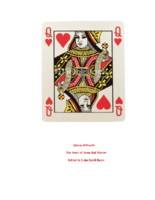Search the Special Collections and Archives Portal
Search Results

Transcript of interview with Bruce Woodbury by Claytee White, February 25, 2009
Date
Archival Collection
Description
When Bruce Woodbury, native Las Vegan, attorney, and former county commissioner, looks back on growing up, he immediately says: My first memory of a house here in Las Vegas was in the John S. Park area. The Woodbuiy family lived in two houses in the neighborhood and attended only two schools, John S. Park Elementaiy and Las Vegas High School. Bruce's recollections begin in the 1940s, when they lived on the edge of town. Bruce has what he calls a "nostalgic yearning for the old Las Vegas, even though today it's an exciting, vibrant community in many ways." And during this oral history interview, he recalls the safe feeling of the times—unlocked doors and children allowed to roam more freely than today. The Strip was a "separate world" where kids like himself might go to a show occasionally with their parents, celebrate a prom dance or, as he did, get a part-time job. One of Bruce's jobs included being a busboy at the Flamingo Hotel & Casino where he confesses to learning and
Text

Transcript of interview with Christie Young by Dennis McBride, October 18, 1998
Date
Archival Collection
Description
I've known Christie Young for many years and was grateful she agreed to be interviewed for the Las Vegas Gay Archives Oral History Project. Not only is she frank in what she says, but her background as a researcher in sexual issues and as a straight woman involved in the gay community give her a unique perspective. Ancillary to her donation of this interview transcript to the University of Nevada, Las Vegas, Christie has generously donated her personal journals which detail more than a decade of her life including the years she worked with Las Vegas's gay community . Christie shares the project's concern that documentation of the gay community is ephemeral and vanishes rapidly; her determination that her contribution to that community be preserved greatly enriches our knowledge and will benefit future scholars.
Text

Transcript of interview with Priscilla Scalley by Claytee White, July 24, 2014
Date
Archival Collection
Description
Priscilla and Joe Scalley arrived in Las Vegas in 1972 with their two young daughters. Joe had just completed his residency in radiology and came to Las Vegas to practice at Sunrise Hospital, where he eventually became Southern Nevada’s first neuroradiologist. The couple took out two mortgages to buy their house at 2900 Justice Lane, in the Rancho Nevada Estates section of Ward 1. They were the second owners of the house, which had been built in 1967. In 1993, after their daughters had graduated from high school, the Scalleys sold the house and moved to Summerlin. Joe Scalley died in October 1994. After Joe died Priscilla became reacquainted with and married the father of one of her daughters’ childhood friends, Joel Jobst, who was also widowed. Joel was a nuclear physicist retired from the Nevada Test Site. Priscilla and Joel bought a vacation home in Montana, where they spent every summer. They celebrated 13 years of marriage before Joel passed in 2013. As a young mother Priscilla joined the West Charleston Elementary School Parent Teacher Association and eventually became president. She helped found the Friends of the Libraries when the Clark County Library District had only two libraries—Flamingo Library and West Charleston Library—and served as that group’s president. She also was active in Junior League of Las Vegas and was president 1983?84. In her early forties Priscilla became a travel agent, a career that kindled a passion for travel that still burns brightly. She also is interested in genealogy. Although she has traveled the world she yearns to take her daughters, sons in law, and grandchildren to Ireland, the land of her ancestors.
Text

Transcript of interview with Joe M. Wilcock by Claytee White, April 17, 18, & 30, 2014
Date
Archival Collection
Description
Chef and longtime gaming executive Joseph “Joe” Wilcock was born in Detroit and raised by his mother, Ruby, and stepfather, Ross Johnson, in Sarasota, Florida; Gary, Indiana; and Harlan, Kentucky. After he graduated from high school in Gary he moved to Chicago to attend Washburne Culinary Institute. While attending Washburne Joe worked at Chicago’s Drake Hotel and lived at the Sears YMCA. After earning his certificate from Washburne, Joe worked at the newly opened Holiday Inn in Chicago, the Sea View hotel in Bal Harbour, Florida, and a resort at Blowing Rock, North Carolina. At Blowing Rock he heard about the new School of Hotel Management at UNLV and in August 1969 23-year-old Joe headed for Las Vegas with $400 in his pocket. Las Vegas was a disappointment. Joe could not get a job as a chef without first joining Culinary Workers Union Local 226-which he could not afford to do. Also, because he ran a poker game and cooked at the Chuck Wagon Diner during high school his high school grade point average was roughly a C-, which hindered his admittance into the School of Hotel Management. Undaunted, Joe found a job bussing tables at the Frontier Hotel and joined the Culinary Union so he could work as a chef. He also took three classes at UNLV that semester, earned an A in each, and was admitted to the School of Hotel Management. While at UNLV he affiliated with Sigma Chi fraternity. In his career Joe has worked in all facets of the gaming industry in such Las Vegas properties as the Flamingo Capri, the Frontier, Caesars Palace, the Tropicana, the Dunes, the Golden Nugget, the Mirage, Treasure Island, the Sands, MGM, and the Downtown Grand. He learned the business from the ground up. He also worked at Caesars Tahoe and at different times owned and operated a sandwich shop and a bar. Joe married his wife, Linda, 38 years ago in Las Vegas, in 1976. He is currently employed as a casino shift manager at the Downtown Grand hotel and is affiliated with the House Corporation of Sigma Chi Alumni, UNLV Rebel Golf, the Las Vegas Natural History Museum, and Candlelighters Childhood Cancer Foundation of Nevada.
Text

Transcript of interview with Linda Lintner by Claytee White, February 12, 2013
Date
Archival Collection
Description
The daughter of a soldier, Linda Lintner and her mother traveled from North Carolina to Overton, Nevada to stay with Linda's grandparents when she was only six weeks old. After her father joined the family, they moved to Las Vegas where both her mother and her father started working at the Post Office. Linda attended local elementary and middle schools in the valley, and in due time, Rancho High School. In this interview, Linda shares not only her memories of growing up in Las Vegas but also fascinating stories about the almost decade long round the world sailing journey that she and her second husband began in 1986. In the course of the decade, Linda became a qualified diver, and expert sailor, and developed a lasting appreciation for the world, its oceans - and the skills you learn when you live on a boat with one other person for so very long. Since their return, Linda has been keeping busy, volunteering many hours with local veterans homes and the church - we are fortunate that she was able to spend time with our interviewer, too, to share her memories of growing up in Las Vegas.
Text

Transcript of interview with Anna Sipl Meyers by Leita Kaldi Davis, February 12, 2012, February 29, 2012, March 27, 2012, April 6, 2012, April 24, 2012, May 3, 2012, May 9, 2012, May 16, 2012, October 19, 2012, November 16, 2012, & December 7, 2012
Date
Archival Collection
Description
From concentration to ownership of Las Vegas casinos, Meyers owned the Cashbah and the and Queen of Hearts in downtown Las Vegas. Interview dates: 2/12/2012, 2/29/2012, 3/27/2012, 4/16/2012, 4/24/2012, 5/3/2012, 5/9/2012, 5/16/2012, 10/19/2012, 11/16/2012, 12/7/2012.
Text

Mike Montano interview, September 19, 2008: transcript
Date
Archival Collection
Description
First played in Las Vegas with Jack E. Leonard in 1960. Only worked at two hotels during his 24-year Las Vegas career - Flamingo and riviera
Text

Transcript of interview with Marcy and Jack Simon by Barbara Tabach, May 16, 2018
Date
Archival Collection
Description
It was 1964 when Jack Simon met Marcy Stiel at a mutual friend’s wedding. Smitten from the beginning, the couple married shortly thereafter. Thus began their loving partnership that has flourished in business, community involvement, and most importantly in raising their two sons, Ron and Steven. The Simon’s can be a modest power couple. However, they are clearly capable of making things happen. When they first married, Jack was a California electrical contractor and homebuilder and Marcy became his business administrator. The Simons through their Electrical Company, Expo-Tech Electrical & Plumbing Services, Inc. won the contract to provide all of the electrical services for the entire 1984 Los Angeles Olympics, encompassing (26) twenty six venues located in California spanning from San Diego to Stanford University. The trajectory of the business was extraordinary, establishing twelve offices nationwide to provide temporary electrical and plumbing services for conventions and special events. Expo-Tech was eventually bought by industry giant GES. Their success was due in large part to Jack’s technical knowledge and Marcy’s administrative and marketing skills. With entrepreneurial zest, and over the period of eleven years, the couple found their way into the ownership of four local casinos in Elko and Wendover Nevada. Marcy was one of the first women in Nevada to hold multiple gaming licenses. In total, she held four Unrestricted Gaming Licenses. The Simons hosted Passover Seders for the Elko Jewish Community during their ownership of the casinos. In 2004, Marcy and Jack sold the four casino operations. Since moving to Nevada in 1994, the couple has made a warm and lasting impression, being generous in their focus for the well-being of the Jewish community. They are among those that actively paved the way for SB26, which outlaws government bodies from conducting business with companies that boycott Israel. They continue to be tireless advocates and philanthropists in Jewish organizations of Las Vegas and Nevada.
Text

Leonard M. Jessup interview, August 6, 2018: transcript
Date
Description
“I decided to just keep going, and I devoted my career to higher ed. I wanted to continue putting back into this system that I felt I got a lot out of. Again, repaying a debt.” What began as a passion for playing school sports would later lead Dr. Len Jessup on a path to lifelong service in the area of higher education. From his California childhood he would soon find himself across different U.S. states performing various higher education duties from professor to university president. In this interview, Jessup talks about his grandparents’ decision to emigrate from Italy to the U.S. and how grateful he feels towards his family as a result. He recalls playing baseball in college. In his eyes, being part of several sports teams helped him develop into the person he is now. He describes doing research during at the University of Arizona and speaks to what it was like moving from one university position to the next. Ultimately, his colleagues would recommend that he move to Las Vegas to
Text

Transcript of interview with Alice Ward Boyer by Joanne Goodwin, June 26, 1996
Date
Archival Collection
Description
Alice Ward Boyer arrived in Las Vegas from Oklahoma in 1937. Her brother and former husband came earlier to escape the dustbowl depression and get settled. In the middle of the summer, just at dusk, she emerged from the train at Kingman, Arizona with her two small children to meet her family and drive through the darkness to her new home in Las Vegas. Although she missed the trees of the Plains, she soon became accustomed to her desert home. Her recollections revive the older Las Vegas when community life characterized the small town. At the heart of her story is the Mesquite Club. The non-partisan civic activities of the Mesquite Club are part of a national history of women’s club voluntarism in the nineteenth and twentieth century United States. Founded in 1911, this pioneer Las Vegas women's club played an essential role in the development of the growing town. When few cultural or social services existed, the club raised funds for the first public library, developed parks for the city, and provided services and funding for the aged and youth. The Mesquite Club, along with the Parent Teacher Association, scouts, and church activities formed a network of community relations commonly found in developing towns and cities, but not ususally associated with Las Vegas. Alice Boyer joined the Mesquite club in 1944. She first served as the chair of the Garden Committee, then "went right up through the chairs," and was elected President of the club for 1958-59. (See Table of Offices Held). Speaking about the Mesquite Club founders, Alice Boyer said, “They were very forward-looking women. They knew that the town would grow and they wanted the best for the town.” As one of the second generation of members, she has found the club to be a continuing source of congenial social life and civic community building. Born in rural Oklahoma, she spent her early years on a ranch. Her parents met there shortly after "the run to open Oklahoma" around 1892. They met, married and had twelve children, nine of which survived. Alice came right in the middle. She spent her early years riding horses, wearing “overalls," and spending as much time as possible outside. The family moved into Clinton, Oklahoma for better schools for their children when she was in the fifth grade. Alice graduated from high school just as the Great Depression began and worked briefly at a newspaper before marriage. At the time of the interview, Alice Boyer’s vivaciousness, gracious manner, and sharp memory belied her 82 years. This interview has been produced with the assistance of the Mesquite Club and the History Department of the University of Nevada, Las Vegas. It is part of a series on women community builders in Las Vegas. The transcript has been edited only slightly for clarity while the syntax and style of the narrator were retained.
Text
